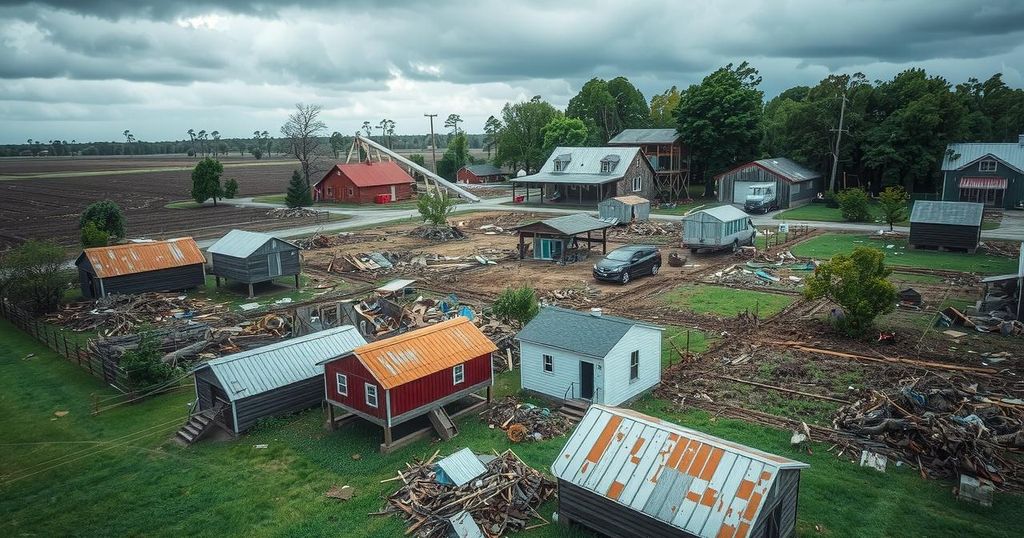Agricultural Devastation: Farmers Struggle After Hurricane Helene
Farmers in the South, especially Georgia, continue to deal with the aftermath of Hurricane Helene, which resulted in significant agricultural losses estimated to exceed $10 billion. Various crops, particularly cotton and poultry, experienced devastating impacts, with farmers questioning whether to rebuild or leave the industry altogether. Immediate governmental assistance is essential to support recovery efforts for affected farmers and agribusinesses.
Farmers across the South, particularly in Georgia, continue to grapple with extensive damages caused by Hurricane Helene, which struck in late September as a Category 4 storm. The aftermath reveals twisted equipment, uprooted crops, and destroyed poultry facilities, as agricultural losses pile up significantly. Chris Hopkins, a farmer in Toombs County, expresses a common sentiment, stating he is emotionally burdened by the choice of whether to rebuild or abandon his efforts. Estimates suggest that combined losses could exceed $10 billion, with Georgia farmers alone suffering at least $5.5 billion in damages.
The devastating impact of Hurricane Helene extended beyond Georgia, affecting areas such as North Carolina and Virginia, where farmers sustained additional severe losses. The storm hindered the cotton harvest right as it was commencing, leaving many farmers unable to salvage their crops. For cotton growers like Hopkins, the hurricane resulted in significant loss; he estimates that approximately half of his cotton yield was destroyed, leading to financial shortfalls that insurance will not fully cover.
Hundreds of poultry houses were demolished, leading to extensive operational impacts for farmers and related businesses in the poultry industry. As highlighted by industry expert Mike Giles, recovery will demand rebuilding efforts that could last for years, thus impacting local production for an extended period. The situation is dire, and farmers require swift assistance to navigate the overwhelming challenges before them. While consumer prices may not see considerable effects, given that crops can be sourced from other regions, pecan production could face unique challenges, as Georgia is a significant contributor to its supply nationwide.
Overall, the lasting effects of Hurricane Helene pose significant threats not only to individual farmers but also to the broader agricultural economy of the impacted regions. The pressing need for aid and support remains crucial as recovery efforts continue.
The resilience of these farmers is tested as they face the daunting task of rebuilding not only their livelihoods but also their futures in the agricultural sector. The road ahead will depend on both community support and immediate governmental assistance to help alleviate some of the burdens brought by this catastrophic event.
Hurricane Helene made landfall in Florida on September 26, 2022, impacting agricultural regions across the southeastern United States. With significant agricultural productions in states like Georgia and North Carolina, the hurricane’s destruction came at a particularly vulnerable time, coinciding with the cotton harvest. Affected farmers are now confronted with extensive damages, mounting losses, and an uncertain economic future, prompting calls for aid and recovery support. The total estimated losses across the affected regions highlight the vulnerability of the agriculture industry to natural disasters, particularly for crops and livestock reliant on favorable weather conditions for successful yields.
In conclusion, Hurricane Helene has inflicted devastating losses on Southern farmers, significantly affecting their crops and livelihood amidst an already challenging agricultural landscape. The estimated losses amount to over $10 billion across the region. Immediate relief measures are vital to support farmers in recovery, addressing not only their immediate needs but also facilitating the restoration of their operations. The resilience of the agricultural sector will depend on effective governmental response and community support during these unprecedented times.
Original Source: abcnews.go.com




Post Comment